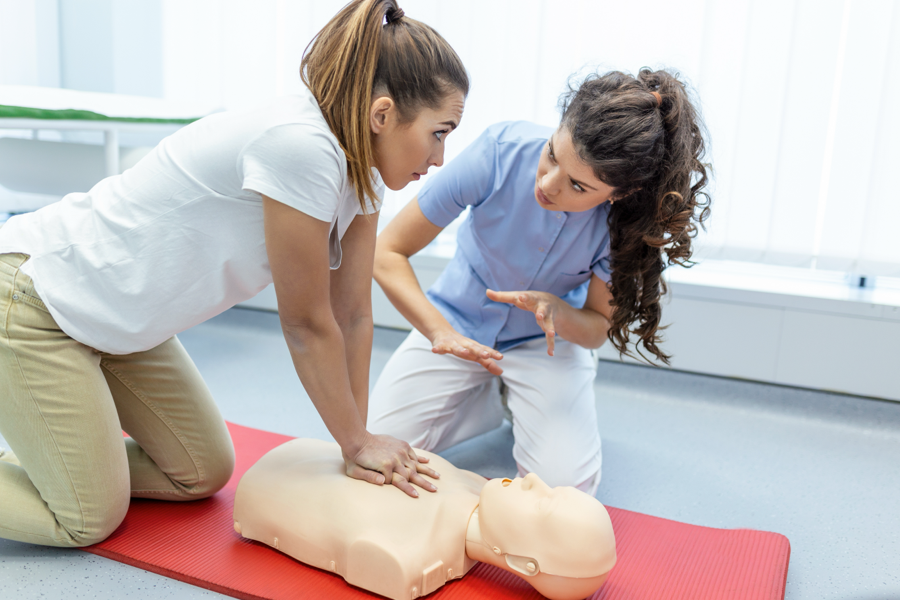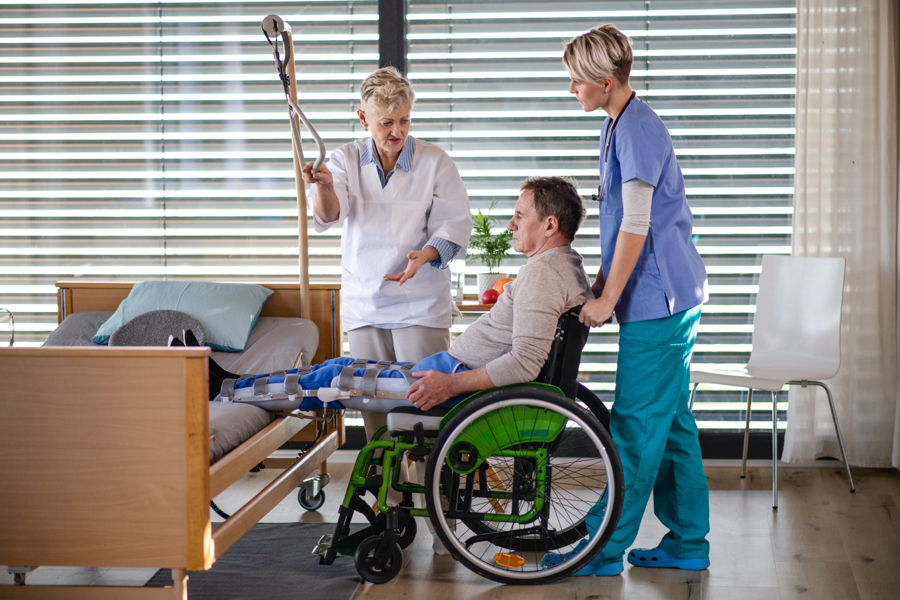
CNA Classes
EveryNurse Staff

Table of Contents
CNA classes are an excellent choice for students who want to enter the field of nursing and earn valuable healthcare experience in a relatively fast and cost-effective way. CNA training prepares students to become certified nursing assistants, who are responsible for helping patients with activities of daily living, assisting with personal hygiene, and communicating vital health information about a patient’s condition to other medical staff.
What Are CNA Classes?
CNA classes are training courses designed to prepare students for careers as certified nursing assistants. CNA classes are offered at community colleges and vocational schools and typically last four to twelve weeks, depending on the program’s curriculum, format, and the level of medical training required. Some programs provide both in-classroom lectures and hands-on clinical experience in a hospital or long-term care facility, while others may offer online courses with an externship component.
CNA programs cover basic patient care, infection control, nutrition, anatomy, communications and documentation, safety and emergency procedures, and patient rights. Students also receive hands-on training in performing basic nursing tasks such as taking vital signs, moving patients, and providing personal care. Students must complete a state-approved CNA program and pass a state-administered certification exam to earn their CNA license and begin working.
What You'll Learn in CNA Classes
In CNA school, students learn basic nursing skills including patient care, hygiene, nutrition, basic medical terminology, and safety. A significant part of the program is dedicated to hands-on training, where students learn patient assessment, communication skills, and medical procedures by practicing on medical mannequins in a classroom setting or caring for actual patients under the supervision of a licensed professional nurse.
A typical curriculum may include the following topics:
Patient Safety & Cleanliness
Patient safety and cleanliness are a top priority for CNAs, as they play an important role in preventing the spread of infection and illness. CNA classes cover basic safety procedures, including infection control, hand-washing, transfer belt placement, clearing an obstructed airway, and how to clean and maintain a sanitary environment for patients.
Students receive instruction on identifying potential hazards such as poor lighting, cluttered hallways, unsafe electrical equipment, unlocked wheelchairs, and other common safety hazards. Students are also taught how to use safe body mechanics to help them avoid injury and prevent accidents when handling patients during the course of their daily tasks.
Professional Communication Skills
Communicating effectively in a hospital or nursing home setting differs from everyday conversation. In a health care setting, the ability to communicate clearly is crucial to preventing miscommunication, avoiding mistakes, and providing high-quality patient care. CNA students are trained in professional communication skills such as active listening, verbal and nonverbal communication, and how to handle difficult conversations.
Additionally, CNAs learn how to document patient care and interactions with other medical staff. Documentation helps to ensure that patients receive quality care each time they interact with a nurse, physician, or other medical professionals.
Basic Needs
Basic needs are the daily necessities that patients require to be comfortable and healthy. When taking care of a patient, CNAs must meet these basic needs by providing fluids and food, monitoring food intake and hygiene, helping patients with personal care tasks such as bathing and grooming, assisting with mobility and exercise, recognizing signs of malnutrition or dehydration, maintaining clean bedding and clothing, and providing emotional support.
Activities of Daily Living: Personal Care
Activities of daily living refer to the tasks that patients must perform every day to take care of themselves. These tasks include bathing, dressing, eating, brushing their teeth, using the restroom, and moving around. CNAs help patients with these activities by providing instructions, physical assistance, and emotional support. Students learn how to perform these tasks professionally and with consideration for the patient’s dignity.
Activities and Exercise
Food and Fluids
Elimination
Elimination refers to the process of getting rid of waste from the body. Patients who are unable to use the restroom on their own must have assistance in order to stay clean and healthy. CNAs help with elimination by providing bedpans or urinals, helping patients to the bathroom, assisting with personal hygiene, and emptying drainage bags.
CNAs learn how to measure the output of waste, which is important in tracking a patient’s health. Elderly patients who struggle with incontinence often become socially isolated, negatively impacting their quality of life. Nursing assistants must help them manage incontinence and encourage them to remain as active and independent as possible.
Vital Signs
Vital signs are a set of four key health indicators that provide important information about a patient’s well-being. They include body temperature, heart rate, respiration rate, and blood pressure. CNAs take vital signs to track changes in a patient’s condition and to alert the supervising nurse or doctor of any concerns.
During their training, aspiring CNAs learn how to take patient vital signs correctly, and they become familiar with common abnormalities. A nurse aide is not allowed to diagnose or treat patients, but they can notify supervising staff of any changes, patterns, or developments that need to be addressed.
Special Procedures
In many health care facilities, a certified nursing assistant must care for patients who have undergone special procedures such as intubation, i.e., the insertion of a tube through which the patient receives oxygen and nutrients. Future CNAs must also be taught to care for patients who have had a stoma procedure, including monitoring the patient’s intake and output. Although CNAs do not put these tubes into place, they must monitor patients who have had these procedures and report changes to their supervising nurse.
Mental Health
While in a hospital or long-term care facility, many patients struggle with mental health issues. As a result, a certified nursing assistant must learn how to recognize the symptoms of common mental health issues such as depression, dementia, and problems caused by stress or anxiety. They must also know how to provide support to patients who are dealing with these issues.
CNAs are not mental health professionals, but they play an important role in the mental health of their patients. By providing emotional support, encouragement, and comfort to patients with mental health issues, CNAs can help them to cope with their condition and improve their overall mental health.
CNA Classes Online
The landscape of online learning has changed dramatically in the past 10 years, as technology has evolved to a point where online instruction is now a viable and sensible option for students pursuing roles up and down the full spectrum of the healthcare industry.
In addition, many trade schools and community colleges have responded to the changing needs of potential students by developing comprehensive online CNA classes that combine online instruction with hands-on clinical training. In this way, students can learn about the various aspects of being a certified nursing assistant via an online curriculum while also receiving valuable hands-on experience and skills training in the care of patients in a clinical setting.
Important "Soft Skills" CNAs Need
A nurse aide program teaches the technical parts of the job, but a good CNA must develop certain “soft skills” that often are not taught in classes. Specifically, a good nursing assistant will possess compassion, flexibility, attention to detail, and many other personality traits often developed over time.
Nursing assistants work in difficult environments, often surrounded by patients suffering from various ailments and injuries. CNAs can expect to encounter many challenges during their daily routines as they seek to improve their patients’ quality of life.
Compassion
People who require the services of a CNA are sick or in pain, or they are no longer able to care for themselves. Treating patients with empathy and compassion helps to reduce social isolation, depression, sadness, and anger. To recover their health, patients need to feel as if they are understood, loved, and surrounded by individuals who truly care about them and their well-being.
A certified nursing assistant demonstrates compassion in many ways through acts of kindness, gentle words, and non-verbal cues. Sometimes, the CNAs may take the time to listen to their patients to understand their feelings. Showing compassion comes more easily with time spent on the job. Still, to gain confidence and develop these skills, many entry-level certified nursing assistants are mentored by senior-level CNAs for a period of time.
Ability to Adapt
CNAs work in environments that often change rapidly and radically throughout the day. While the everyday activities in a nursing care facility may be routine-based, with many tasks performed regularly, patient needs can change dramatically and without warning. A good CNA must be capable of recognizing developments in their patient needs and have the ability to adapt and react quickly to new and unusual situations.
While the appropriate training helps a CNA develop confidence in altering situations, no education can prepare a CNA for every scenario that he or she will encounter on the job. CNAs must have common sense, flexibility, and the ability to stay alert while on the job to adapt to new situations as they arise.
Team Player
Strong Communication
A nursing assistant speaks with patients and their families, doctors, nurses, hospital staff, and administration during a typical day. In all these situations, the ability to understand and be understood is critical.
CNAs must be able to comprehend and then explain, in simple layman’s terms, both basic and complex medical and health information. They must give clear instructions to patients, demonstrate compassion to those who are sick and injured, and interact patiently and effectively with families during situations when they often are experiencing overwhelming emotions. Mastery of both verbal and body language during these encounters is critical.
Strong Work Ethic
Nursing assistants perform difficult, physically, and mentally intensive work at any location and with any patient population. In a normal workday, a nursing assistant must be willing and able to move and transport patients, help patients exercise, and manage other basic tasks. CNAs also must be able to think critically, solve problems, and meet patient needs. Good nursing assistants need energy and a positive attitude to help them get through each day.
Attention to Detail
Patience
Positive Thinking
Often, nurses encounter challenging colleagues and difficult situations involving patients in varying stages of injury or illness. For example, CNAs who work in nursing homes spend their days caring for residents who are often in various stages of mental and physical decline – an environment that can lead to the caregivers experiencing feelings of despair and stress. The ability to maintain a cheerful, positive attitude is vital in these circumstances.
A successful CNA has the ability to feel hope and project optimism in difficult moments, which affects not only the nurse’s own outlook but also the outlook of those around them. CNAs who possess these qualities make a significant impact on the quality of patient care.










